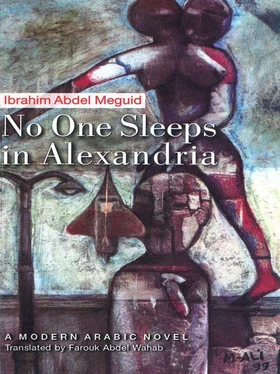“How is French?”
Strength came back to her. She answered with a question, “How did you know?”
“You wouldn’t believe me if I told you that before I left you I had seen in your eyes a desire to do everything that I liked to do.”
They walked. She left her hand in his. He was back, with that strange talk that she did not understand. He seemed to her like a rainbow in the sky. She did not understand what that feeling meant; she did not know if she had thought about it before, but that was how he seemed to her, really: a rainbow crossing the sky in a fire chariot drawn by rainbow horses.
“Woe to you, Camilla, woe to you,” she said to herself after silence had descended for a short while.
“What did you say?”
“Will you wait until I finish my lesson?”
“I will wait for you until the end of time.”
“You talk funny, Rushdi,” she laughed. “I don’t understand you at all.”
“What do you say we change the lesson this time and walk for a little bit?”
They walked to Rami station. They stood on the corniche, invigorated by the cool breeze and the sea spray. He feared the lecherous eyes of the soldiers, white from England and Australia and black from all over the world, so he walked quickly with her to the opposite sidewalk, with its old, typically Alexandrian cafes filled with Greeks, sailors, and soldiers as well. A number of drunken soldiers came out from the Windsor, hurrying together with a number of young women who wore short khaki skirts that reached above their knees despite the cold. Each soldier had his arms around one of the young women as they walked and sang, opera style. He told her, laughing, that students were now saying that after the war the English should leave the country but leave behind the young women of the ATS. Camilla knew that they were conscripts, but he told her that their official jobs were as secretaries and telephone operators in the English camps and establishments, that they had different military ranks exactly like the men, but that their real job was to entertain the soldiers. He said they were not just English but French, Greek, Cypriote, New Zcalanders, Indians, and South Africans and from all over the British Empire. Camilla never thought beyond the literal meaning of these pretty young women in the Auxiliary Territorial Service, abbreviated by the press to ATS and pronounced al-Atsa by the Egyptians. They stopped in front of the statue of Ismail Pasha in Manshiya.
“Let’s stand here like a couple of European tourists,” he said.
“Have you been to Europe before?”
He had put his arm around her and she felt his ribs under his shirt and light pullover, and he felt her fleshy warmth.
“I must go one day.”
“You’ll take me with you?” She clung to him even more closely.
“We may very well find that to be the only option available to us,” he said, reminding her of what she had managed to forget in the summer. If only she had never studied French!
They kept on walking. Many fezzes appeared in the square, with its cafés that attracted brokers; merchants; stock-exchange experts; seekers of fame, fortune, glory, and happiness; would-be pashas and beys coming from the countryside to do business; and sailors who had gotten tired of the cheap bars of Bahari and the cheaper women of Haggari and who came here in search of better bars and prettier women. The square was also filled with horse-drawn carriages that raced along with their human cargo. And above it all was the statue of Muhammad Ali Pasha, ready to take off as the wind mirthfully played in the wide open space and on the ground where it kicked up the little leaves that had fallen indolently from the tree in the middle of the road.
“Where do you live?” she asked him.
“Not far from you. You live in Ghayt al-Aynab. I followed behind you once all the way to your door.”
She looked very surprised as he continued, “I live halfway between Karmuz and Kafr Ashri bridges. There’s housing for railroad workers there. It’s an isolated, quiet place in front of Mahmudiya Canal and a big, empty stretch of land — completely safe.”
“I know the place well,” she said. “It’s a really beautiful place, and the most beautiful thing about it is that no one can spot it or get to it easily.”
He stopped and looked at her very closely, holding her shoulders without fear or shame. “Listen to you, you’re saying beautiful things.”
She laughed and started to walk again after gently removing his hands from her shoulders. “I’ve gone there with mother many times to buy fish from the salt works,” she said. “There’s a long, dark tunnel you go through, and then you find yourself right smack at the salt works.”
“Exactly.”
She did not want to tell him that she had gone several times to that very housing compound with her father, mother, and Yvonne to visit their relative Usta Ghibriyal, whom Rushdi surely knew and who surely was his father’s boss.
“A man who lives in our house works for the railroad,” she said.
“I don’t know him. He doesn’t live in our house,” he said, and they laughed. She felt regret for her indiscretion but soon overcame it, for she had not mentioned the name of their tenant or that of Ghibriyal in any case.
Camilla went home that day like a free sparrow flying in a magnificent space. But as soon as she sat down, a gloom that she could not shake descended upon her. Her mother could not figure it out, nor could anyone else except Yvonne, who realized that her sister was at it again. Every night now Camilla would decide to break it off with Rushdi for good, and in the morning would wait for the afternoon when he came. He was very considerate. He asked her to let him follow her four days a week, and two days a week go out with him to some place far from home.
The priest, with his ruddy complexion, black beard, and black cassock, appeared at the house, and Zahra saw him for the first time, even though he had been to the house many times before. Zahra started hearing long speeches that she did not understand, and prayers and chants that she did not understand either. Every time the priest came, silence descended on the house, and Sitt Maryam closed the door of their room without looking at anyone who might be there, even when Khawaga Dimitri was present. An hour or more later the priest would come out, and Zahra would hear loud voices bidding him farewell, “Good-bye, father, may the Virgin protect you!” She also heard sobbing, but she could not tell whether it came from Camilla or Yvonne. She also rarely saw Camilla and Yvonne now, as they no longer sat out with their mother but stayed in the inner rooms after returning from school.
That continued to be the case until one day the air-raid siren sounded ominously, heralding imminent danger. True, the siren sounded intermittently with every raid, every day, and it sounded the same, whether the raid was big or small, but somehow, people had developed a sense, a sort of intuitive feeling about particularly bad raids by hearing the sound of the siren. Did that sound actually change, or did the war unite people and sensitize them in such a way that they were able to prophesy, like prophets or mystics? The feast at the end of Ramadan had ended ten days earlier with a big raid that lasted from six o’clock in the evening to ten, but it was scattered over various neighborhoods, so it did not leave a large number of casualties concentrated in one place. Today, however, people in Karmuz, Ghayt al-Aynab, Raghib, Masr Station, and Attarin felt that they, the very heart and pulse of Alexandria, were the targets.
That day Zahra had asked Magd al-Din several times about the priest and his visits, which occurred sometimes more than twice in one week and about the silence, the crying, and the mumbling, but Magd al-Din told her, “Leave creation to the Creator, and take care of what’s in your womb.”
Читать дальше












